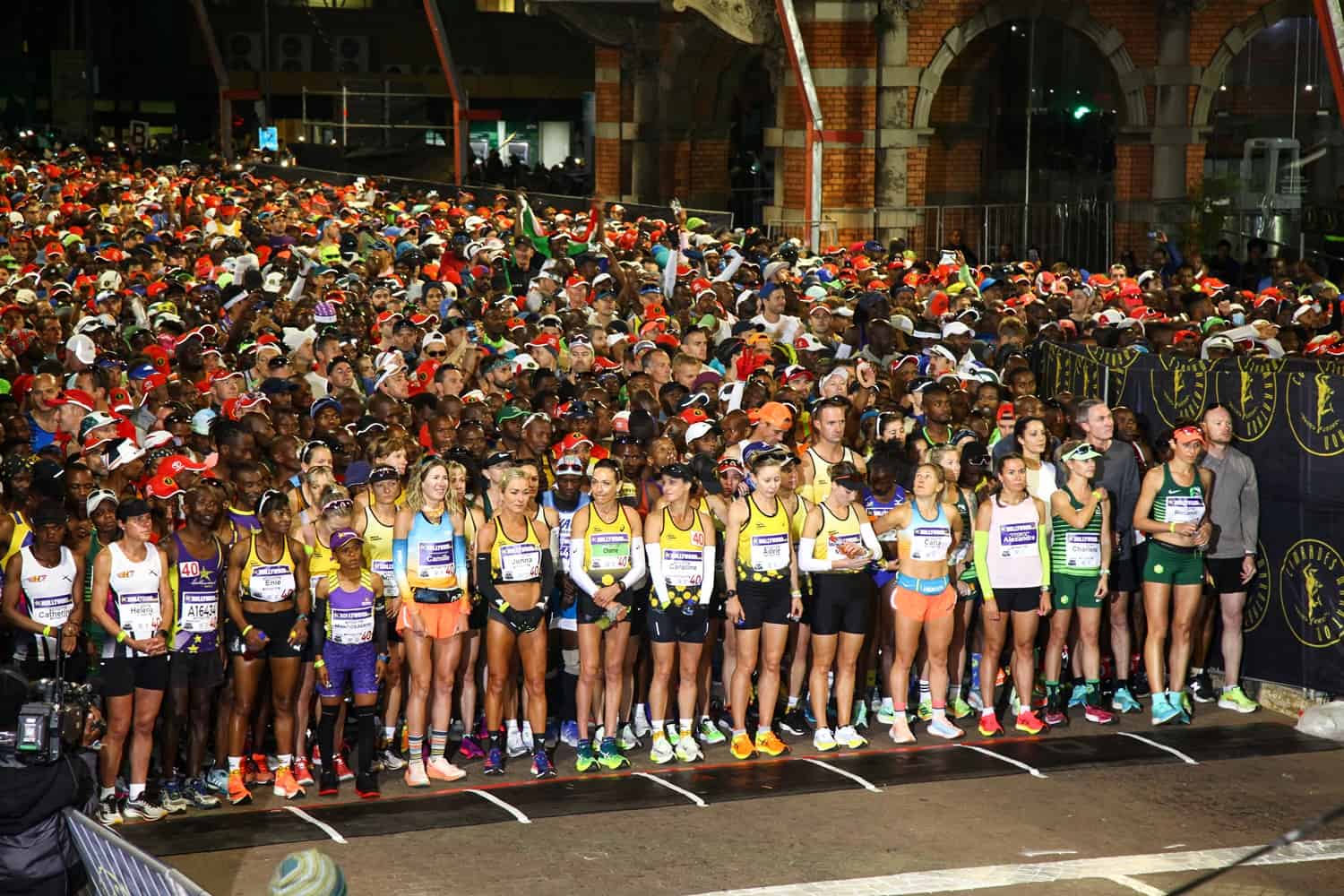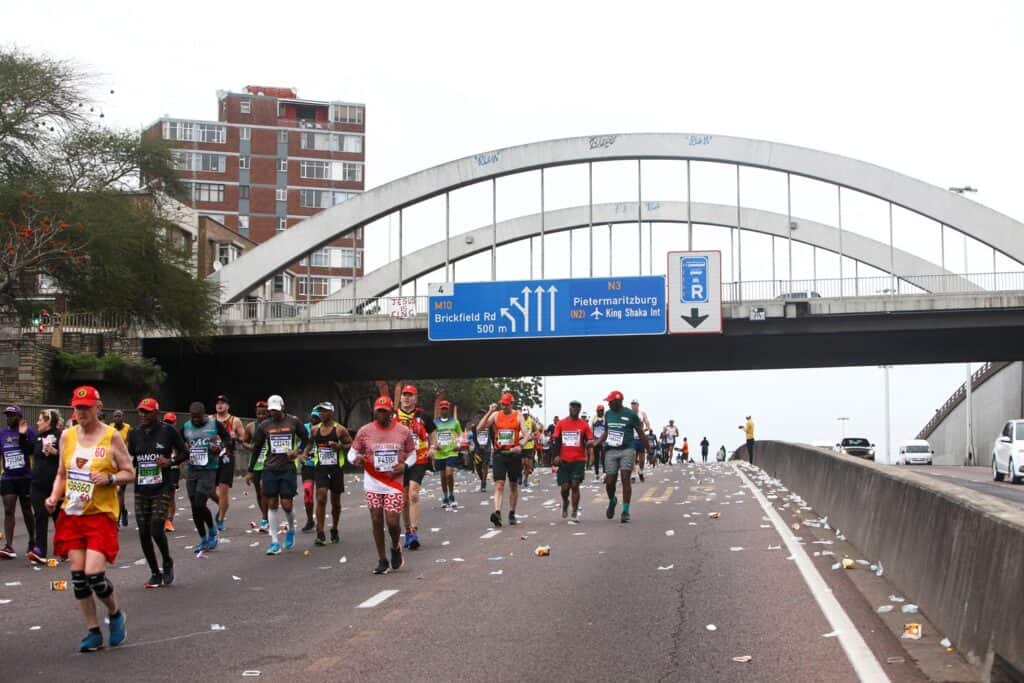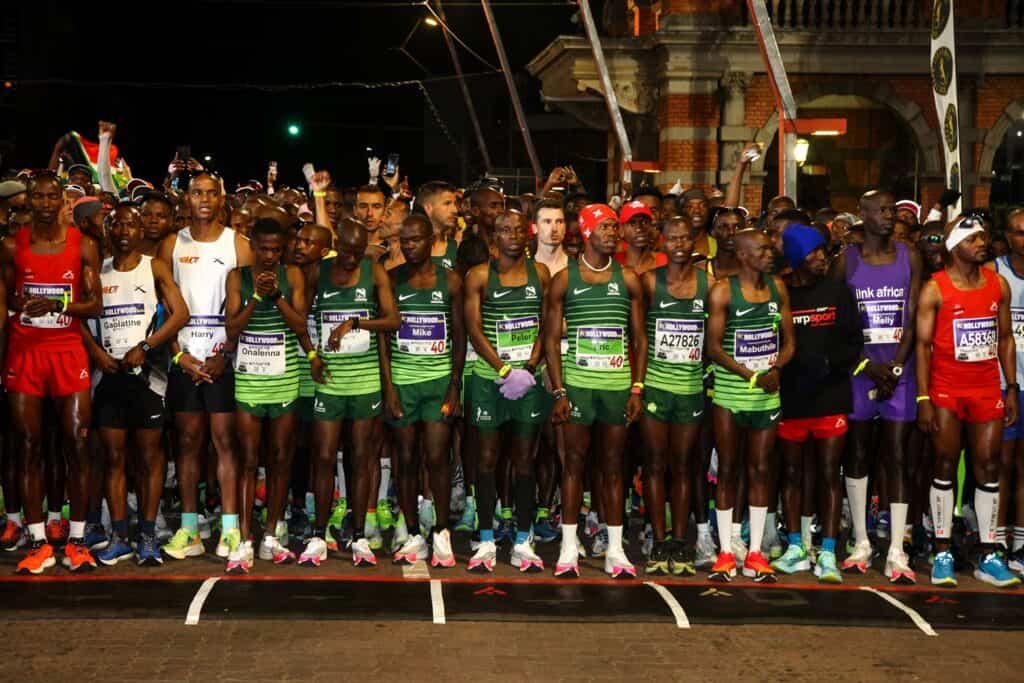What if you’re on the margins in terms of achieving your goal Comrades Marathon time?
So whether you’re aiming for a sub 9 hour or maybe you’re chasing a Robert Mtshali or a sub 10 hour… maybe bronze or perhaps you’re like a lot of the field where you’re worried about making that 12-hour cutoff…
For the runners who are on the margins of their 12-hour cut-off, this article is crucial. But for everyone else who’s chasing specific medals… there’s a lot you can take from this article too.
So, let’s find out how you save a ton of time on Comrades race day…

It starts right at the beginning of the race… literally before you even start running the Comrades Marathon.
I’m going to first run through what you can expect to lose depending on your seeding on comrades race day so that you can start to mentally prepare yourself for that and because it’s a key element in how to save yourself time on race day.
If you’re an A seeding or an elite athlete, obviously you’re not going to lose any time getting over that start line. B seedings will lose up to a minute, C seedings will lose up to two minutes, and D and E will lose between two to three minutes. And E and F will lose between three and six minutes with the G batch losing between seven and eight minutes and the H batch losing between eight and twelve minutes on race day.
So that is a lot of time to be losing before you even cross the start line, that’s the reason why I’ve said everything starts before the start of the race.
Time Saver Tip Number 1
You need to make sure that you get to the front of your batch.
You must make sure that you get into your seeding pen early so that you don’t get pushed toward the back… it’s a first come, first serve process.
Depending on your batch, this could save you between two to four minutes on race day.

Time Saver Tip Number 2
This time-saver tip is also key in terms of your mindset, and helping you save time on race day.
So that means that you’ve got an additional 10 to 15 minutes depending on what medal you’re going for.
When we used to work out the Comrades finishing prediction, the traditional two and a half times marathon time used to leave athletes short.
So now with that extra 2.5 kilometers, there is no excuse not to make it and that’s important because it means that when you cross that start line, you don’t have to panic. You don’t have to be in a mad rush to try and catch up.
If you’re in the 12-hour category or H batch, you’ve got all that extra time and your predicted finish time is actually under 12 hours. So there is no stress for you about making up time.
The time that you have lost you can take 80 kilometers to catch it up. So the cut-offs are planned in a way that you only have to catch up the time you’ve lost by kilometer 80.
So definitely take your time catching it up.
With all that in mind…
Time Saver Tip Number 3
You are going to save time on race day by making yourself this promise.
Once you have crossed the start line for every second for the rest of the day, you are going to make sure that you take a step closer to Durban you don’t have to run the whole way to finish the Comrades marathon, you can and you must walk sections of the course to make sure that you get your goal time at the end of the day.
What is very important is that each second of the day must include a step forward. To simplify that, you’re going to promise yourself that from now until you finish… you will not stop.
“I will keep moving. I will walk at water points. I will walk when I see my spectators but I will not stop!”
To give you an idea of how much time you will save by not stopping: As you go along the Comrades route. There are 46 aid stations/ hydration points.
If you have to stop at even half of those….You will lose between 20 and 30 seconds per table and that is going to cost you 10 to 20 minutes, depending on how often you stop.
The more tired we get, the longer we are stationary when we do stop and so other those stops turn into one-minute stops, then two-minute tops.
So you will save yourself between 10 and 20 minutes on race day, by not stopping at water stations.
If you stop, when you see your seconders along the side of the road… you’ll end up having a conversation with them and that will cost you between one minute and 2 minutes.
If you see your spectators/seconders two to three times on the route, that’s probably six minutes that you’ve cost yourself on race day.
Massages are great. And if you’ve got lots of time to make your cutoff for your medal, that’s fine, you can have a massage and it will make you feel better for a couple of kilometers.
But if you’re tight on your time, stopping for a massage will cost you between three and five minutes.
So if we were to do the math:
- If you arrive late at the start, you’re going to cost yourself between two to four minutes, let’s be conservative, go with two.
- If you stop at water stations, you’re going to cost yourself between 10 and 20 minutes again, we’ll be conservative. And we’ll go with 10/12 minutes.
- If you see your spectators two or three times along the route, that’s six minutes.
- If you stop for a message… that’s between 3 and 5 minutes.
At the end of all that you’ve cost yourself about 20 minutes on race day.
So if you just keep moving, even if it’s walking, that’s 20 minutes quicker, that you will get to the finish line than you would have if you keep stopping along the way.

In my maths above, I left one point out and I left it out on purpose.
If you do not get yourself on track on your pacing chart, slow down and prevent yourself from chasing time in those first 8 to 20 kilometers… When you get to halfway, for every minute that you are under your recommended time, you can add on four minutes for the second half.
Once you get five minutes ahead of your pacing chart, you can start adding eight minutes per minute in the second half.
So once again, if we do the maths on that, four minutes too quick, through halfway, and you’re costing yourself 16 minutes in the second half.
Go five minutes or faster, and you’re looking at 40-plus minutes that you will lose in the second half. Because of the amount of walking, you will be forced to do.



Comments are closed.